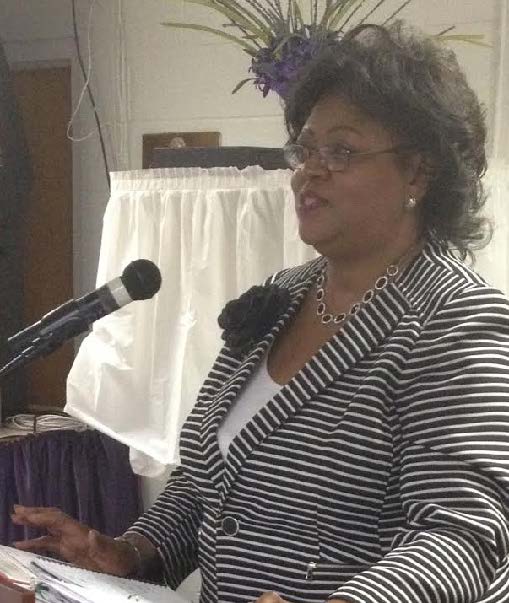
Ex-felons’ stories shed light on need for new Ready4Work program

Lucretia Shaw Collins said Bethel Empowerment Foundation’s Ready4Work program will offer computer training and other skills to ex-felons.
Photo by St. Clair Murraine
By St. Clair Murraine
Outlook staff writer
A group of individuals testified about their struggles with substance abuse, which eventually led to run-ins with the law before overcoming their plight to lead productive lives with assistance from a handful of re-entry programs in Tallahassee.
Freda King told one of the most inspiring stories, outlining her recovery from a life of dealing and using drugs, prostitution and losing her children and husband.
On her way to recovery, she graduated from FSU magna cum laude and has committed her life to help others with restoring their lives. She currently works as director of a recovery program with Leon County Jail and the LIFT program at Disc Village.
King often tells her story to motivate others.
“It was dark,” said King in a brutally honest tone. “It was grinding and it was lonely.”
For the past 10 years since her recovery began 16 years ago, King has been working to help others out of the same fate she faced. Operators of some of Tallahassee’s other recovery programs also detailed the issues ex-offenders faced in their efforts to restore their lives after incarceration.
The forum-like discussion on ways to prevent recidivism was part of a weekend-long event hosted by Bethel Missionary Baptist Church. It concluded Sunday with a 90-minute program that included recognition of Kris Knab, who is retiring as director of Legal Services of North Florida.
Candidates running for the offices of Sheriff, county judge and state attorney general also participated in the awareness event billed as “Criminal and Social Justice.”
Rev. R.B. Holmes also presented a discussion on the topic “Where do we go from here?”
Holmes, pastor at Bethel Missionary Baptist Church, has taken the initiative against recidivism that will soon come to fruition.
In less than three months, ex-felons whose lives are as rocky as King’s will be able to participate in Ready 4Work, a program being introduced by Bethel Missionary Church Empowerment Foundation to assist their recovery to a normal life.
“It’s so important that this re-entry program could be established so we as a community could come together,” said Rev. Linda Provitt, whose brother, Mark Wilson, has an extensive criminal background. “It takes a community or a village to make a difference and if you just change one person’s life that one may be able to change 100 or 1,000.”
That is the intent of the Reday4Work program, which interim director Lucritia Shaw Collins said will begin in August. The program will be structured similar to one run in Jacksonville by Operation New Hope for the past 15 years.
The Tallahassee program will service 50 to 75 offenders ages 18 and older who have less than a year remaining on their sentences. A voluntary program also will be available to non-violent, non-sex offenders in Gadsden, Wakulla, and Jefferson correction institutions, said Shaw Collins.
Anyone out of prison for two years and is involved in community service also will be eligible for the program, she said.
She added that the testimonies she heard proved the need for the program.
“After hearing our presenters’ stories, it’s more evident than ever that we are moving in the right direction in helping to restore the lives of offenders and the need to help them with their families,” Shaw Collins said.
Having families involved in the recovery process is a huge factor, said Eddie Hardley, director of operations for Living Stone International. Children often are lost – sometimes confused — when a parent is incarcerated, he said.
“They feel like they are the ones that make their parents do whatever it is that they did and because of that their grades start to decline,” Hardley said. “They stop going to school; they become depressed and their friends and those they may hang out with begin to look at them differently because their parents are incarcerated.”
Hardley and every other speaker made a point of stressing that there is no quick fix to recovery for an ex-offender. King presented some supporting facts about incarceration in Leon County: The average age is 32, 69 percent are Black and 85 percent have substance abuse issues.
She also said that 38 percent of prisoners don’t have a high school diploma.
One of them was Wilson, who admittedly is still struggling with finding a normal life since his release last year after serving time for battery and parole violation, seemingly would be a perfect Ready4Work candidate. He said he is working a part time job, but is still without a home.
“It’s a slow walk, but I keep my head up,” he said.
He praised his sister, Provitt, for helping his recovery.
“My sister is the perfect example of family,” he said. “No matter how bad the situation seemed, she was always there for me. She really understood that I had a problem. She actually saw everything we talked about.”






